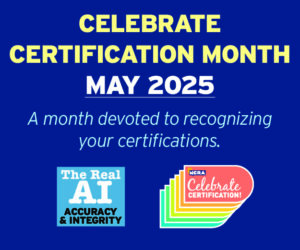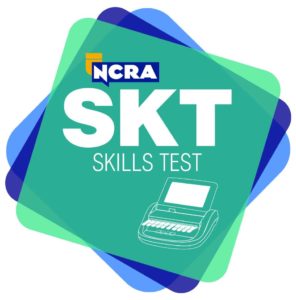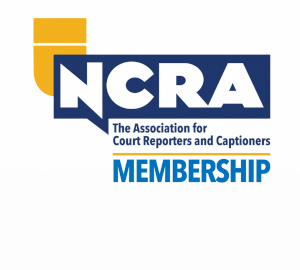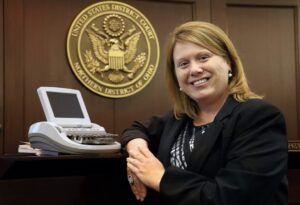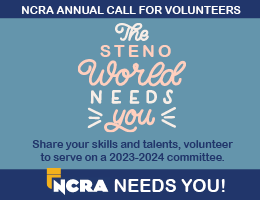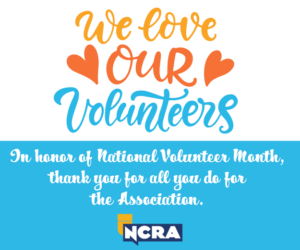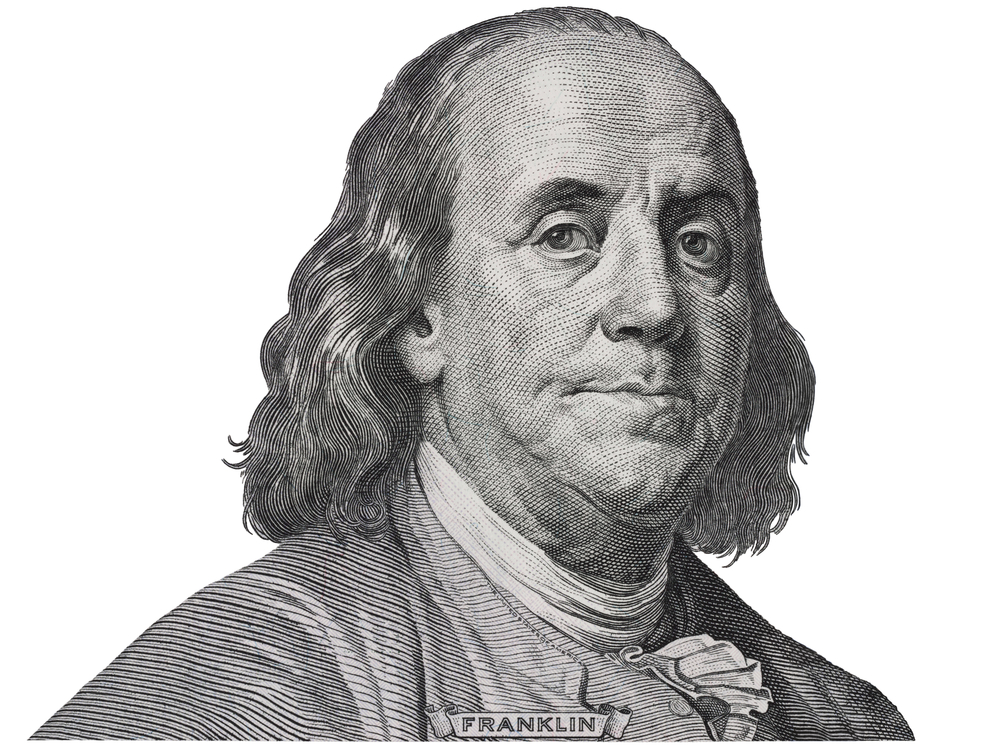
Benjamin Franklin, one of America’s founding fathers, is credited with the phrase, “Do well by doing good.” Pro bono work is just that. In Latin, the term means “for the public good.” For many NCRA members, it means giving back to their community by providing services at no cost for a variety of venues and audiences. The opportunity for the provider to grow their network, sharpen their skills, possibly learn new skills, and, of course, to make a difference are among the benefits of offering your services on a pro bono basis.
Providing pro bono services (judicial, CART, captioning)
Pro bono services are defined by the Council of the Academy of Professional Reporters (CAPR) as “providing court reporting, realtime, CART, or captioning services for which compensation in any form was not rendered.” In practice, this can include any variety of services, such as providing CART captioning for a deaf consumer at a meeting or church service or taking depositions for litigants who could not afford reporting services. Specifically, 0.25 PDC will be awarded for a minimum of 2.5 hours of pro bono service, of which 30 minutes can be the preparation involved. Services for two one-hour events plus 30 minutes of preparation, for example, can be combined for one submission. The preparation time will be accounted for on the honor system. Members will submit an NCRA form along with the processing fee when requesting the credits. The form must be signed by either the deaf consumer or the host of the event for which the pro bono services were performed. The JCR recently reached out to several NCRA members to learn more about the pro bono work they do and why they do it.
LeAnn M. Hibler, RMR, CRR, CRC, is a freelance CART provider and captioner from Joliet, Ill.
JCR | Where and when did you volunteer your services pro bono?
HIBLER | Every spring for the past 12 years, I have provided overhead CART captioning on a pro bono basis for an Illinois Hands & Voices event called Mom’s Night Inn. The “moms” of deaf and hard-of-hearing children stay overnight at a hotel, and they share experiences and information. On Sunday morning they have a panel of people with hearing loss, which is what I provide the captioning for.
JCR | What motivated you to offer to provide your services pro bono?
HIBLER | At the time I was providing captioning for an undergraduate student whose mom was involved with Hands & Voices. She fought to have captioning for her son in high school and then college. She wanted to spread the word about CART captioning and asked me if I would provide my services at a Mom’s Night Inn, and the rest is history.
JCR | Did you use this experience to earn Professional Development Credits from NCRA?
HIBLER | I think it’s great that NCRA allows its members to earn PDCs for providing pro bono work, but, no, I have not taken advantage of it yet.
JCR | Why is it important for any professional to provide their services pro bono?
HIBLER | It’s important on a professional level because it’s a great opportunity for networking and business growth. Oftentimes when you are working on a pro bono basis, you are allowed to disseminate your business information free of charge. How can you go wrong with free advertising?
JCR | Do you have plans to provide more of your services pro
bono in the future, and if so, do you know where and when yet?
HIBLER | Well, clearly a year from now I’ll be working again with Hands &
Voices. My pro bono work comes into play when a special situation arises. A
couple years ago, I was asked to work a memorial service for the nephew of a
consumer I knew. It was a few blocks from my house, and I was more than happy
to do it pro bono.
JCR | What have been the greatest personal rewards for you from these activities?
HIBLER | Oh, I just love people. I’ve met the most wonderful people through my captioning jobs and learned about non-profit organizations that do great work. I have no problem providing a couple hours of captioning for free, especially for organizations that hire me on a regular basis. I figure I have the time, I have a fantastic skill, and I’m happy to do a nice thing for our consumers from time to time.
JCR | What would you say to someone to encourage them to offer their services pro bono?
HIBLER | If you think of pro bono work as a hassle, you’re never going to want to do it. What you should do is pick an event that means something to you in some way. Maybe you have a soft spot for indigent litigants. Maybe you’d like to caption for the parishioners in your church. Maybe you’re trying out some new technology and need an audience. Remember, you can use your pro bono work as a way to introduce yourself to potential new clients. You may be working for free today, but it could bring new business for tomorrow. Just do it. It might even make you feel good!
Gayl Hardeman, FAPR, RDR, CRR, CRC, CRI, is a freelance CART provider, captioner, and agency owner from Pinellas Park, Fla.
JCR | Where and when did you volunteer your services pro bono?
HARDEMAN | In December we were contacted by a grant recipient who needed interviews with survivors of human trafficking transcribed. The transcripts were to be used to create a docu-drama to educate people about the scourge of human trafficking. There were 10 interviews to be transcribed within a few weeks’ time, as the grant recipient was facing a deadline with the performance to take place in late January. I decided her cause was genuine and one that aligned with my values; namely, to help people know about this established network of traffickers and unwitting trafficking victims. I knew I couldn’t transcribe almost 25 hours of interviews over the holidays, so I’d need help, and four of my colleagues stepped up and helped me meet the deadline. My colleagues — Tammy Milcowitz, RMR, CRR, CRC; Kathryn Bentley, RPR, CRC; Leslie Schwartz; and Holly McKay — were fantastic in giving their time and skills. Thank you!
JCR | What motivated you to offer to provide your services pro bono?
HARDEMAN | To serve those who serve, and to help spread the word that a whole pattern of modern-day slavery exists.
JCR | Did you use this experience to earn Professional Development Credits from NCRA?
HARDEMAN | I will probably do so soon.
JCR | Why is it important for any professional to provide their services pro bono?
HARDEMAN | It makes you feel good to assist people by using your skills to create an enduring and useful record for them.
JCR | Do you have plans to provide more of your services pro bono in the future, and if so, do you know where and when yet?
HARDEMAN | I have no plans to, but I often give of my time as a mentor and trainer.
JCR | What have been the greatest personal rewards for you from these activities?
HARDEMAN | I was educated about something I’d heard about. Now I’ve been a firsthand witness to several personal accounts of how young girls were lured into a life of forced prostitution. The best part of transcribing these accounts was finding that the young women emerged from their horrible situations to help others avoid and deal with the aftermath of that life.
JCR | What would you say to someone to encourage them to offer their services pro bono?
HARDEMAN | We get a kind of burnout at times in our career, so to reframe our skills as tools for human education and justice elevates our purpose and identity.
Ninette Butler, RPR, CRR, CRC, Realtime Systems Administrator, is a freelance court reporter from Orlando, Fla. She is part of a team that provides live streaming on Sundays at a local church.
JCR | Where and when did you volunteer your services pro bono?
BUTLER | First Baptist Orlando.
JCR | What motivated you to offer to provide your services pro bono?
BUTLER | A heart to serve and use our God-given talents for those in need.
JCR | Did you use this experience to earn Professional Development Credits from NCRA?
BUTLER | I do if I need additional credits to complete my cycle.
JCR | Why is it important for any professional to provide their services pro bono?
BUTLER | It’s a unique talent that we are blessed with. It only makes sense to share it with others.
JCR | Do you have plans to provide more of your services pro bono in the future, and if so, do you know where and when yet?
BUTLER | This is an ongoing ministry for us every Sunday.
JCR | What have been the greatest personal rewards for you from these activities?
BUTLER | I feel we get so much out of it in return, by being able to hear such an impactful message every week. The people that we serve are also so very grateful. We don’t get that kind of gratitude in the legal setting!
JCR | What would you say to someone to encourage them to offer their services pro bono?
BUTLER | If there is a little voice inside you that is yearning to serve others, prayerfully consider where God will place you and look for opportunities. There’s always a place designed just for you!
Deborah Weaver is a freelance court reporter and owner of Alaris Litigation Services in St. Louis, Mo.
JCR | Where and when did you volunteer your services pro bono?
WEAVER | At Alaris we have a long-standing tradition of helping worthy causes. We are committed to giving back to organizations that make a difference in the communities we serve. Alaris is involved in many community efforts. A few of these include:
Let’s Start. For more than 13 years we have packed lunches for children to take on the bus when they go visit their mothers in prison.
Center for Women in Transition. Involved in providing resources and community support to women who have recently been released from prison.
Dollars for Depositions. By developing this program in partnership with the Missouri Coalition for the Right to Counsel (MCRC), we are able to provide funding for deposition services to support individuals who may not be able to afford them otherwise.
BAMSL Motion for Kids. For more than 24 years, Alaris has supported the Motion for Kids organization, which is a nonprofit that holds an annual holiday party for children in the foster care system or who have been severely impacted by the criminal justice system. Alaris distributes gifts for the kids at the Santa Station and helps with visits from Santa.
JCR | What motivated you to offer to provide your services pro bono?
WEAVER | As a company, Alaris believes by actively participating in the betterment of our communities, we build strong relationships with other organizations, volunteers, and community members while also becoming visible and present to those around us. This strengthens the position of our company, and strong personal relationships can often lead to strong business relationships. Additionally, our charity involvement has introduced us to relationships with people who have become friends outside of business hours.
JCR | Did you use this experience to earn Professional Development Credits from NCRA?
WEAVER | No, we did not.
JCR | Why is it important for any professional to provide their services pro bono?
WEAVER | I’m a firm believer in using your unique talents to serve the community in which you live and work. I believe it is something everyone should do, no matter how large or small. The legal community has always supported me personally and my companies, and this allows us to give back.
JCR | Do you have plans to provide more of your services pro bono in the future, and if so, do you know where and when yet?
WEAVER | We will continue to support these community projects, and if any come our way that align with our organization, then we are certainly open to supporting how we can.
JCR | What have been the greatest personal rewards for you from these activities?
WEAVER | On a personal level, I find it incredibly rewarding to bring hope, assistance, and joy to someone’s life, most especially a child’s life. It is also rewarding to see our staff get involved and be supportive in these efforts. I see it as “paying it forward,” using my talents to help make the world a better place one little effort at a time.
JCR | What would you say to someone to encourage them to offer their services pro bono?
WEAVER | Just do it! No, really, just do it. Whether it’s helping break the cycle of incarceration or beautifying your neighborhood, find what inspires you and make it an active part of your life. It’s such a privilege to be able to give back to one’s community, and the rewards you see from these efforts are always tenfold. Whether it’s strengthened business relationships, creating lasting personal relationships, or the simple joy of knowing you’ve made your community a better place to live and work, there is always something to be gained.




